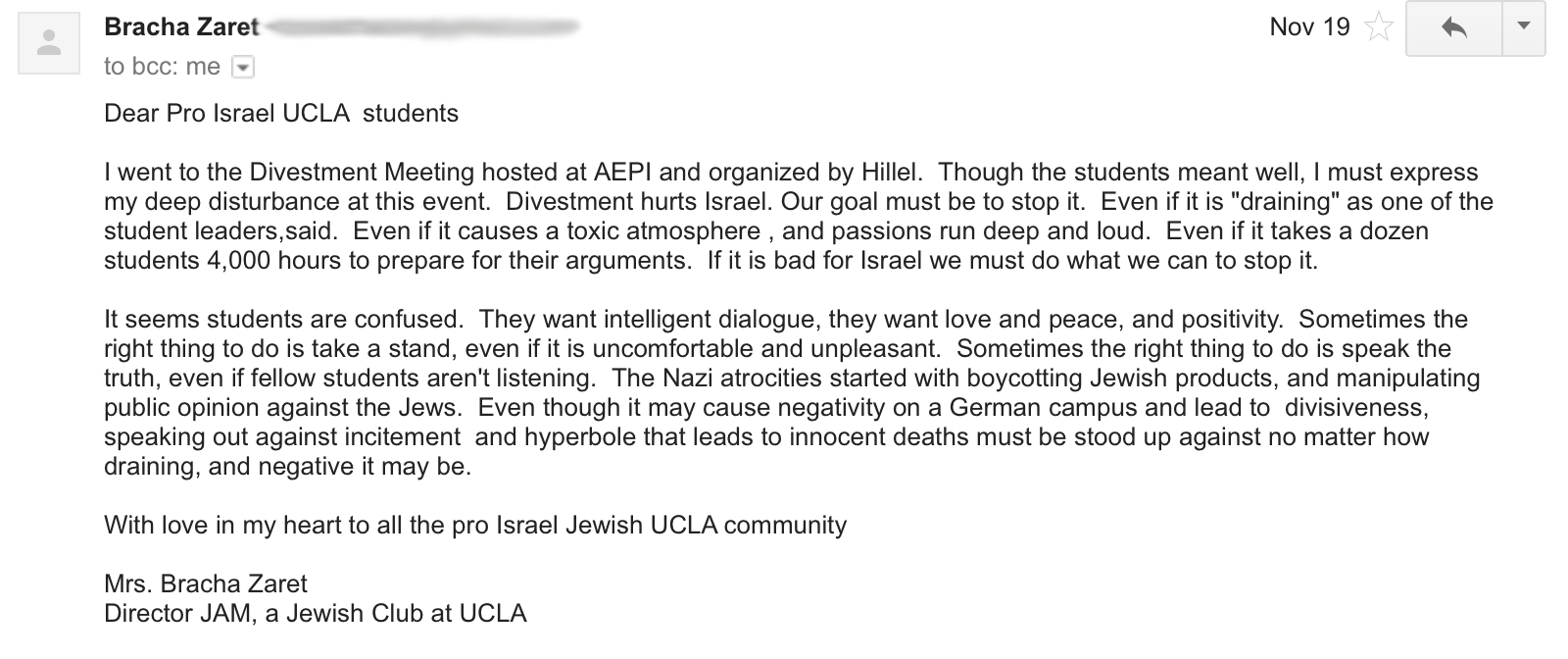The global movement to boycott, divest from, and sanction the world’s only Jewish state ignites a pervasive controversy throughout not only campus life at UCLA, but the Jewish community as well. In previous years, the Jewish strategy was to take a confrontational stance against resolutions affiliated with BDS, spending a taxing 4,000 hours to combat what many identify as — in its essence — an anti-Semitic cause. As this year’s response to BDS, leaders of the UCLA Jewish community decided to create an alternative to attending the Undergraduate Students Association Council’s divestment resolution hearing. This was done in an effort to express the sentiment that BDS is not valid criticism of the state of Israel, that it is not within USAC’s scope to make a ruling on a divisive issue that has no impact on the student body, and that the resolution only forwards a single political or ideological viewpoint.
In the days following BDS’ passing at UCLA, students on the Jewish Awareness Movement’s mailing list received an e-mail from Bracha Zaret, director of JAM, that vilified the Jewish community’s response with statements such as, “though the students meant well, I must express my deep disturbance at this event.” Many students saw her e-mail as a personal affront, since JAM had refused any direct involvement in the fight against BDS prior to the resolution’s passing, only to express criticism after the fact. In addition, JAM refused to cancel their Tuesday night Maimonides class that coincided with the alternative meeting led by Jewish Bruin leaders, causing a sizable number of Jewish first-years to miss the latter. Zaret’s e-mail likened the Jewish community’s response against BDS to the passivity and naiveté of the Jewish people in Nazi Germany, stating that “no matter how draining” the issue may be, a confrontational approach is always the best mode of operation.
Many students felt undermined and alienated by JAM’s sentiments, and while some did not wish to publicly comment, others were outspoken with their feelings. Rachel Frenklak, third-year physiological sciences major, expressed her frustrations in a reply to Zaret’s e-mail, providing a rationale behind the Jewish response.
“The council members went into that meeting with their minds made up, and prolonging the inevitable would have only hurt ourselves and been damaging to the future of Jewish life at UCLA,” Frenklak explained. “I urge you to be open to the idea that our Jewish community student leaders understand the particularities of our situation on campus that you, as of yet, do not.”
Another student, a first year pre-medical student who wishes to remain anonymous, offered an opinion that Zaret’s assessment was unfair because “she was not involved in the background planning … and more importantly she is not a student on campus.”
By nature, BDS is meant to divide people and stir up controversy, and it is entirely understandable that more than one opinion exists on how the situation should be dealt with. In the end, every member of the greater Jewish community holds the same virtue of protecting the Jewish state. However, the degree of grace with which an individual portrays his or her ideas invariably makes an astronomical difference in how the ideas are received by others. And while Zaret did not intend to alienate students in the Jewish community at UCLA, her actions unfortunately did just that. In the words of author and public speaker Stephen M. R. Covey, “We judge ourselves by our intentions and others by their behavior.” In light of this, Ha’Am sat down with Zaret in order to better appreciate her intentions and develop a deeper understanding for her side of the story.
Amidst the muffled sounds of the overcrowded Kerckhoff coffeeshop and the thumping deluge outside, Zaret reflected on the events surrounding BDS. In spite of a personal disapproval of the overall strategy against BDS, she expressed an appreciation for the students’ act of reciting the Mourner’s Kaddish during the alternative meeting. Kaddish was recited in memory of the victims of the six terror attacks in the month preceding the meeting, including a terror attack on a synagogue in East Jerusalem that took the lives of five people earlier that very day.
“This was the first time I ever saw anything where students brought G-d into the picture, and I thought that was amazing,” Zaret said, folding her hands and leaning forward in her chair.
“The students have to be open to critique, and maybe [the Jewish community’s approach to BDS] wasn’t right. Who knows what is right or wrong? You could be open to ‘Well, maybe [Jewish Bruin leadership] made a mistake,’ or maybe JAM made a mistake not canceling [Tuesday night’s Maimonides class], maybe I made a mistake sending the e-mail — I don’t know,” Zaret reflected.
Ultimately, anti-Semitic and anti-Israel efforts constitute unrelenting forces that must always be challenged by a united cause. Although the Jewish and pro-Israel community has never been one to hold a singular opinion, it is imperative for its future success that all of its members support one another. Retroactively rebuking only serves to tear down the united front. In order to have a progressively stronger effort each year, any and all criticisms or doubts must be voiced before the critical moments of a conflict. This would ensure that not only all opinions have been heard and considered, but that the Jewish counterforce is as powerful and united as it could possibly be.
During our conversation, Zaret expressed hope with a final sentiment, saying, “Let’s be Jews, talking about solutions together. We need to think about [our collaborative future] because there is going to be a next year.”

